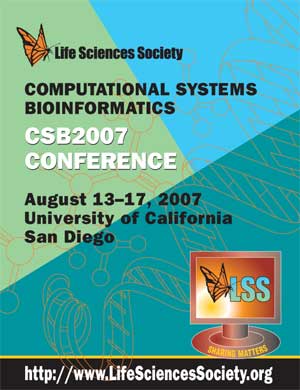Using Directed Information to Build Biologically Relevant Influence
Arvind Rao*, Alfred O. Hero, David J. States, James Douglas Engel
Electrical Engineering and Computer Science, Bioinformatics, University of Michigan, Ann Arbor, MI 48109, USA. ukarvind@umich.edu
Proc LSS Comput Syst Bioinform Conf. August, 2007. Vol. 6, p. 145-156. Full-Text PDF
*To whom correspondence should be addressed.

The systematic inference of biologically relevant influence networks remains a challenging problem in computational biology. Even though the availability of high-throughput data has enabled the use of probabilistic models to infer the plausible structure of such networks, their true interpretation of the biology of the process is questionable. In this work, we propose a network inference methodology, based on the directed information (DTI) criterion, which incorporates the biology of transcription within the framework, so as to enable experimentally verifiable inference. We use publicly available embryonic kidney and T-cell microarray datasets to demonstrate our results. We present two variants of network inference via DTI (supervised and unsupervised) and the inferred networks relevant to mammalian nephrogenesis as well as T-cell activation. We demonstrate the conformity of the obtained interactions with literature as well as comparison with the coefficient of determination (CoD) method. Apart from network inference, the proposed framework enables the exploration of specific interactions, not just those revealed by data.
[CSB2007 Conference Home Page]....[CSB2007 Online Proceedings]....[Life Sciences Society Home Page]